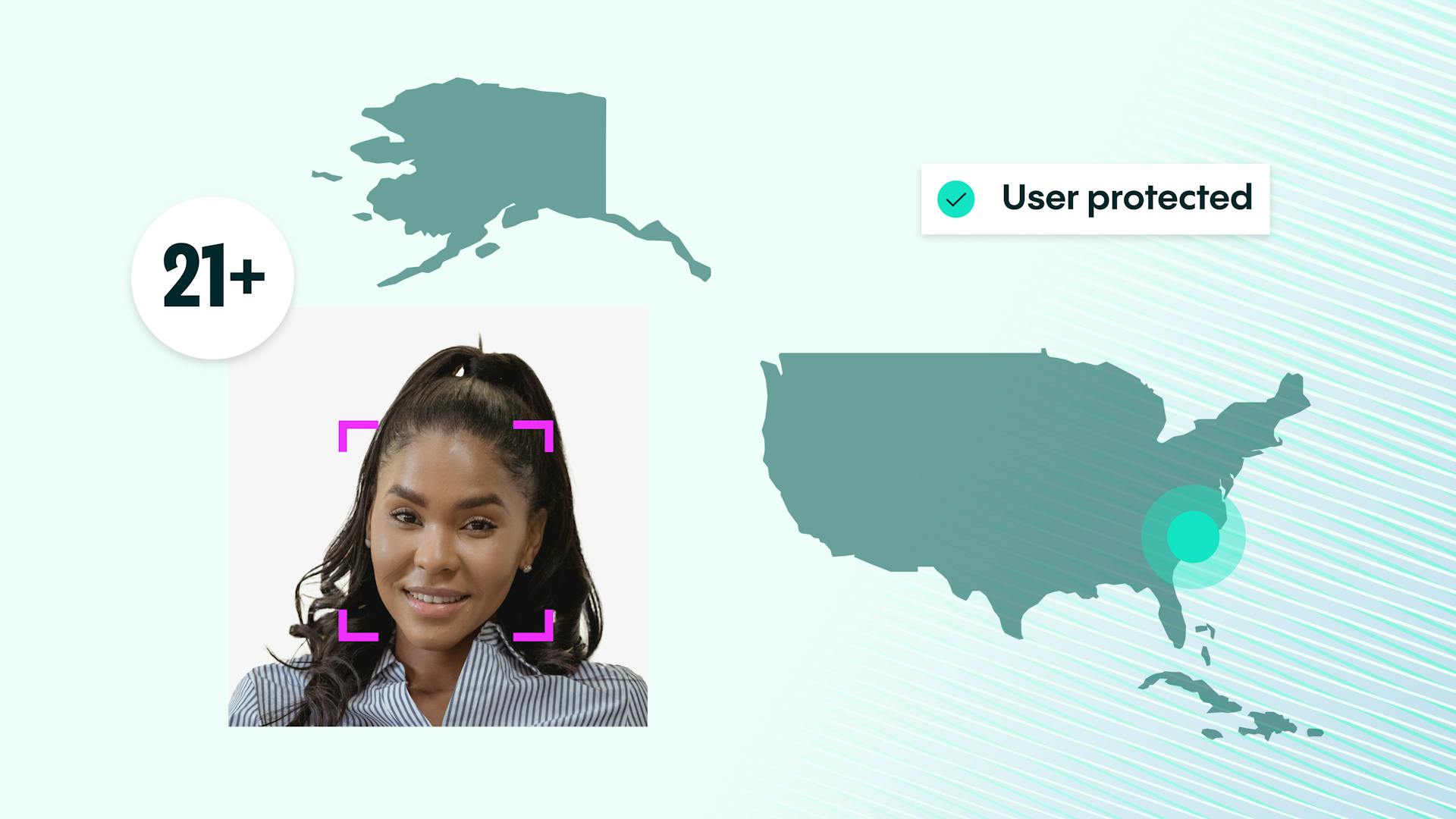Explaining Virginia's Age Verification law for online content providers
Virginia’s new age verification law, effective July 1, 2023, enforces strict age checks for accessing adult content online, sparking debate on safety, privacy, and compliance. Curious about its impact and what it means for online platforms? Read our full blog to learn more.


Dmytro Sashchuk
A 2023 survey of adults in the United States found that women were more likely than men to strongly support the implementation of age verification mechanisms for online content. Meanwhile, six percent of surveyed men said they would strongly oppose the implementation of such tools, compared to two percent of women who stated the same.
In an effort to enhance online child protection, Virginia has enacted a new law (became effective on July 1, 2023) requiring age verification for harmful materials online, such as pornography. Users of these sites in Virginia will have to confirm their age before accessing online adult content.
Virginia’s age verification law primarily targets platforms that publish or host adult content, social media sites, and other websites with potentially harmful material for minors.. These businesses are now legally required to verify the age of users accessing restricted content, ensuring that minors are kept safe from inappropriate material.
The Senate Bill 1515, is an important piece of legislation in Virginia, which requires commercial entities, to establish controls on their websites or platforms to introduce an age verification system to ensure its users are over 18. This bill is a step towards addressing the negative impacts associated with the prevalence of harmful content, such as pornography, and its easy accessibility. This leads to the situation where the average age for Americans starting to view pornography sites at 13.37 years of age.
With the passage of this law, websites must verify users' ages using methods like checking a government-issued ID. Non-compliance could lead to lawsuits for any harm caused by minors accessing such content. The statute dispenses harsh penalties, including potential civil accountability for damages incurred when minors access detrimental content.The act is designed to safeguard minors from harmful online content, with a focus on adult material. They empower individuals to take legal action against pornographic websites.
The response has been mixed. While the law received extensive backing in the General Assembly, the Free Speech Coalition, a representative group of the adult entertainment industry, expressed their reservations and are considering challenging it in court. Also, one of the biggest pornography websites has opted to cease operations in Virginia rather than adopt age verification protocols, while users find alternative ways to access restricted sites. Primary arguments of the opposition are that this restriction won't effectively stop children from accessing pornographic material, risks compromising users' private information, could lead to increased use of illegal content, and that mandating age verification for adult content is unconstitutional.
Defending the need for Age Verification
Despite some opposing voices, state Sen. Bill Stanley strongly defends the legislation, stating in a committee meeting, “If we're going to sit here and just say, ‘Well, there's nothing we can do about it. It's the, you know, darn old internet,’ then we're abrogating our responsibility to our children.” Governor Glenn Youngkin echoed his sentiments by signing the bill into law, which applies to websites where at least one-third of the content is harmful to minors.
Interestingly, Virginia's legislation is part of a broader movement toward age verification laws across the United States. As highlighted in this Veriff article, different states are adopting different approaches to regulate online access to age-sensitive content, emphasizing the need for robust systems that protect minors. This nationwide trend reflects an increasing recognition of the importance of balancing accessibility and safety in the digital age.
Essential compliance strategies for success:
Implement robust Age Verification solutions
Use secure, technology-driven solutions like Veriff’s age verification tools to confirm users are of legal age. Verification through government-issued IDs or AI-powered estimation tools can help meet compliance requirements effectively.
Regularly review compliance practices
Laws around online content are evolving quickly. Stay up to date with changes to age verification regulations, and adjust your platform’s verification processes as needed.
Prioritize user privacy and data security
Protecting user data, especially sensitive identity information, is essential and inherent part of every business’s compliance efforts. Use secure data handling practices to build user trust and maintain compliance with broader data protection regulations.
Provide clear notices for users
Inform users about the age verification requirement and how their data will be used. Transparency helps users understand compliance requirements and reduces friction during the verification process.
Prepare for legal accountability
The Virginia law includes penalties for non-compliance, including potential lawsuits. Make sure your platform is prepared with a well-documented age verification process to avoid liability if minors access restricted content.
By following these compliance tips, platforms impacted by the Virginia law can better safeguard minors and reduce their legal risks.
How can Veriff help?
Veriff is the go-to identity verification partner for leading digital companies in sectors like fintech, crypto, gaming, and mobility. Our cutting-edge technology, deep insights, and expertise, rooted in Estonia's digital-first approach, propel us to the forefront of the digital identity revolution. Chosen by businesses needing quick and easy online user verification worldwide, Veriff covers an extensive range of identity documents. We support government IDs from over 230 countries and territories, and our intelligent decision engine evaluates thousands of technological and behavioral factors, fostering trust from the first interaction.
In the financial services sector, compliance and customer trust are essential. Veriff’s age verification and age estimation solutions meet regulatory requirements while enhancing the customer experience.
Veriff’s partnership with JTI Philippines set a new standard in age verification, safeguarding minors from restricted products, while empowering JTI to uphold stringent compliance requirements. This collaboration highlights how Veriff’s advanced identity technology brings trust and security to age-sensitive industries, enabling brands like JTI to foster responsible access in regulated environments. Erika Viveiros, the Marketing Director at JTI Philippines, recently emphasized the critical role Veriff has played in enhancing their digital capabilities. She stated, “Veriff has been a valuable partner for us in strengthening our digital capabilities and optimizing our processes. With their help, we've been able to grow our reach and elevate the efficiency of our engagement with our customers and consumers online.” This collaboration has allowed JTI Philippines to drive more impactful customer engagement, reflecting the evolving digital needs of their business.
To learn how Veriff can support your organization with reliable, efficient age verification, speak to our sales team today and discover how we can tailor our solutions to meet your unique needs.
Please note that Veriff does not provide legal advice. This article is provided for informational purposes only. You should always discuss your privacy and data protection operations or issues with a qualified legal counsel or privacy specialists.
"Veriff has been a valuable partner for us in strengthening our digital capabilities and optimizing our processes. With their help, we've been able to grow our reach and elevate the efficiency of our engagement with our customers and consumers online.”
Virginia's Age Verification Law FAQ
1. What is Virginia’s Age Verification Law?
The Age Verification Law in Virginia mandates that online platforms verify the age of users attempting to access a site with specific content that may be deemed harmful or inappropriate for minors, such as explicit content. This law aims to protect minors from accessing online content that may negatively impact their safety or well-being.
2. Who is required to comply with this law?
Any business, website, or platform providing access to content considered inappropriate for minors, particularly those hosting any adult content or explicit material, must implement age verification measures if they wish to operate legally within Virginia.
3. What content is subject to age verification?
Content that may be harmful to minors or deemed inappropriate for children, including adult or explicit material, is subject to age verification under this law. The law generally targets content likely to expose minors to mature themes.
Explore more
Get the latest from Veriff. Subscribe to our newsletter.
Veriff will only use the information you provide to share blog updates.
You can unsubscribe at any time. Read our privacy terms



